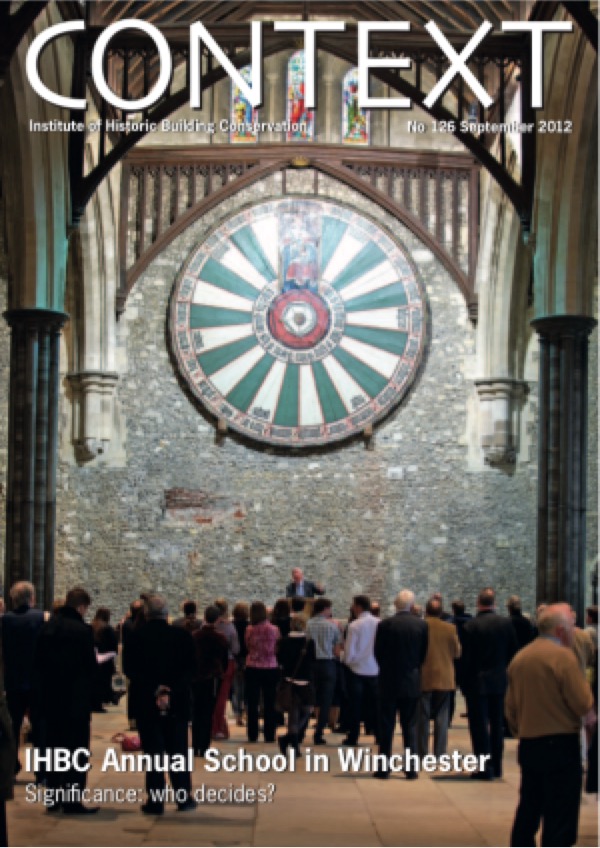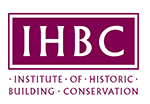
The mark of the conservation professional
2012 IHBC Annual School
Significance:
Who decides?
Winchester
Thursday 21st to Saturday 23rd June 2012
Winchester School Report - Context Issue 126, September 2012
Click image to view
Introduction
The IHBC 2012 Annual School explored ‘significance’, including associated principles such as ‘special interest’ and the processes for assessing value. It presented the latest thinking on who decides what significance is, how it can be determined, and what its role is in conservation. Deciding on the value of heritage is the first step in assessing how best to care for it. An informed understanding of what is significant is necessary to ensure historic resources are properly cared for and conservation resources allocated efficiently.
Ensuring maximum feedback from school
To ensure maximum delegate feedback delegates are directed within two days of the end of the School to an electronic survey form. This approach, first used in 2009, has proved to be very successful. It simplifies the process of submitting feedback for delegates, allows them to make any additional comments with ease and has been shown to deliver more responses than paper feedback forms. In 2012 51% of delegates responded with delegate feedback.
Ensuring maximum feedback from school
To ensure maximum delegate feedback delegates are directed within two days of the end of the School to an electronic survey form. This approach, first used in 2009, has proved to be very successful. It simplifies the process of submitting feedback for delegates, allows them to make any additional comments with ease and has been shown to deliver more responses than paper feedback forms. In 2012 51% of delegates responded with delegate feedback.

Monitoring success of training capacity of school – meeting the IHBC competences
The IHBC Annual School helps members’ meet the IHBC’s Areas of Competence and maintain these competencies. These Competences are the key membership criteria of the Institute and Annual School programmes are developed to cover as many aspects of them as possible. The Competences are shown in the table below (with more information available at link). The Areas of Competence are, however, equally relevant to non-members, conservation professionals and other built environment professionals.

The Professional Area of Competence informs and shapes conservation advice and conclusions, and is the most important and most challenging for applicants. The Practical Areas of Competence correspond to how we achieve conservation, by evaluating, managing and, as appropriate, changing places. These Practical Areas correspond respectively to cultural disciplines such as history or archaeology; to ‘place management’ and regeneration specialisms such as planning; and to design and technical solutions provided by architectural, engineering, urban design and project management skills sets (http://www.ihbc.org.uk/skills_support).
The IHBC’s four Areas of Competence, as represented in the model conservation cycle, in figure 1 below, represent members’ inter-disciplinary skills – the overarching ‘Professional’ Area of Competence, and the three Practical Areas: ‘Evaluation’, ‘Management’ and ‘Intervention’.
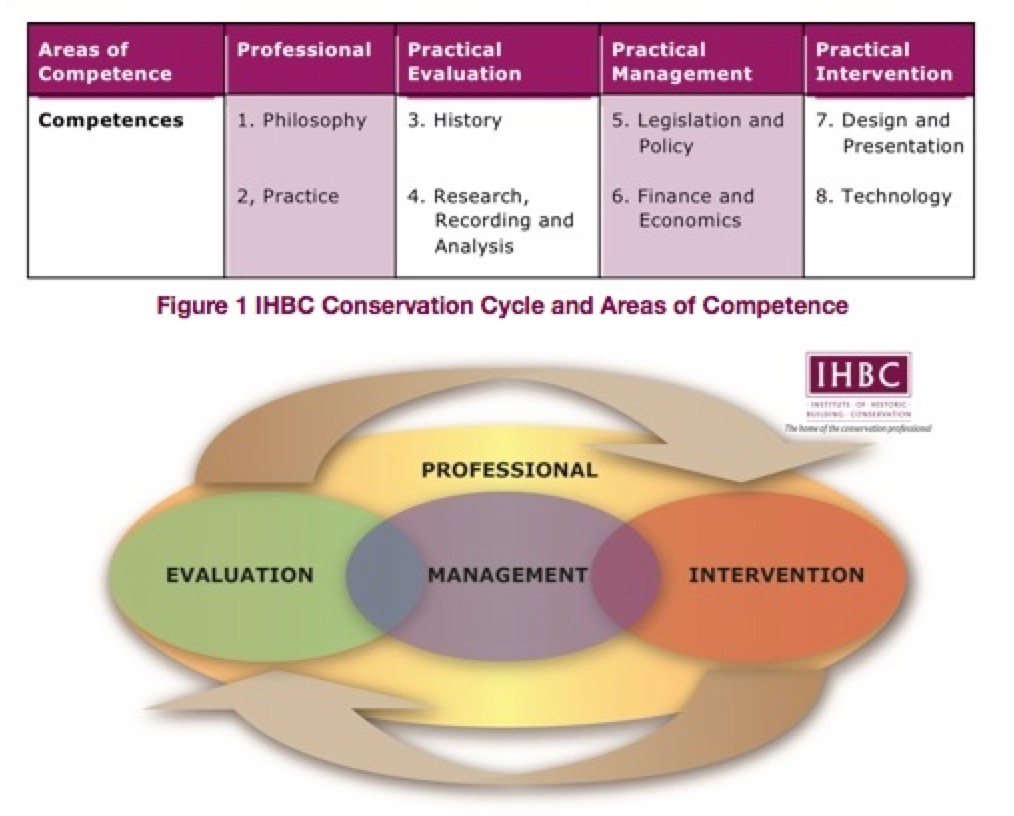
For conservation professionals including IHBC members and prospective members, issues around significance lie at the heart of the first of the IHBC’s ‘Practical Areas of Competence’, Evaluation. Significance also underpins advice and decision across all the IHBC’s Areas of Competence
The matrix below (figure 2) explains how the 2012 Annual School provided training to meet the IHBC Areas of Competence and also dealt with the theme of the school. It shows that the Annual School sessions provided training options to cover all of the IHBC Areas of Competence whilst giving specific training on the School theme of “Significance; who decides”. It is possible using the various options available for delegates to further develop all or some of their competences.
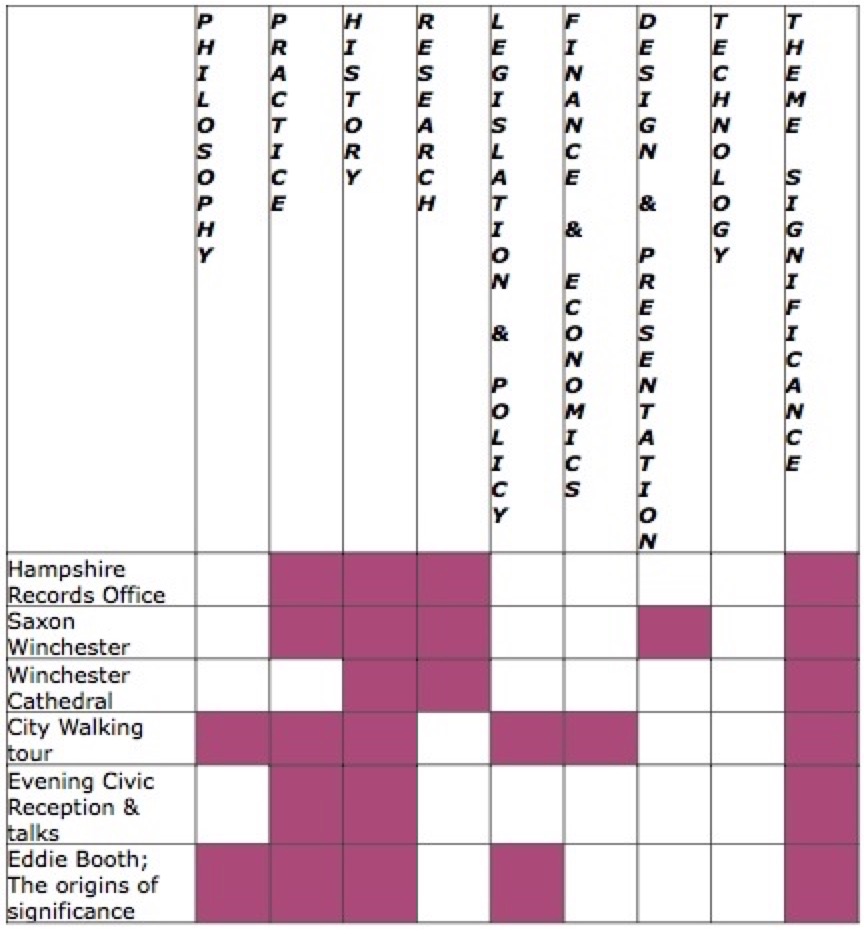
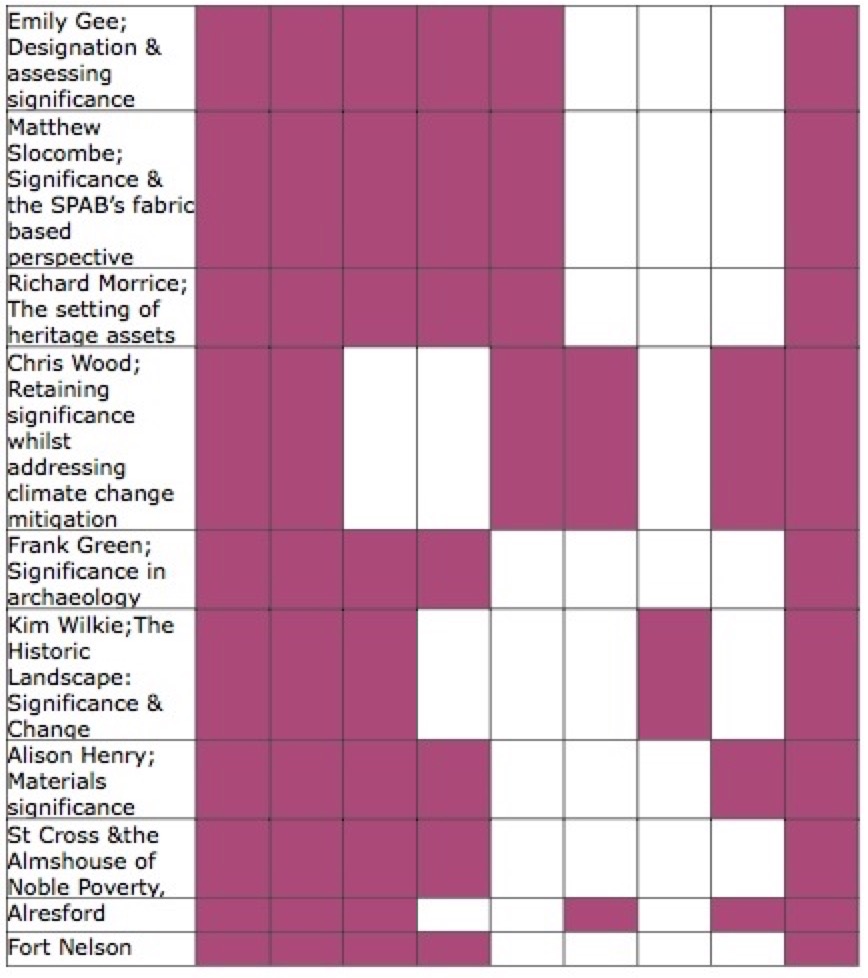
Figure 2
INDICATIVE MATRIX OF COMPETENCES AND THEMES ADDRESSED:
IHBC ANNUAL SCHOOL 2012
Annual School Delegates
Attendance at the Annual School over the past decade has been consistently good and in 2012 the School attracted 239 delegates (159 Day School and 80 Full School), the second highest attendance of recent years. Given the current economic situation and the long running substantial cuts in both conservation posts and available training budgets the attendance was encouraging.
Although the event is organised by the IHBC and is a key annual event for its members it provides training for non-members and all those with a professional interest in conservation. The Annual School continues to provide important training opportunities for those outside the Institute. 18% of the School delegates (which is 33 Day School delegates and 10 Full School delegates) were not members of the IHBC, demonstrating the School’s wider appeal.
Delegates to the Annual School come from a variety of different types of employment falling into the three broad categories shown in Figure 1; Local authorities, private practice and government bodies, quangos and charities. Local Authority employees participate relatively equally in both the Day School and the Full School, whilst those working in private practice are less likely to stay for the Full School preferring the intensive lecture programme of the Day School. The Full School also include delegates in receipt of the bursaries offered by the IHBC either nationally (http://2012school.ihbc.org.uk/bursaries/bursaries.html) or through bursary schemes run by various IHBC branches.
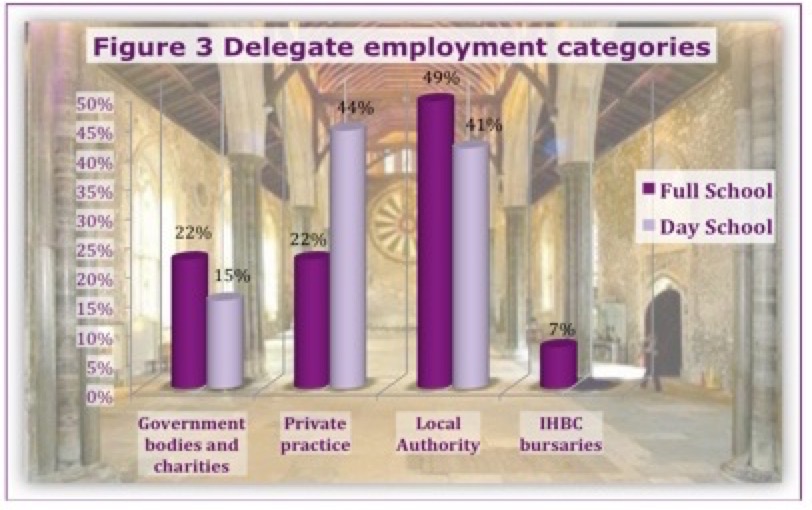
Monitoring success of training capacity of school – delegate feedback
(i) Conference content and CPD value
Delegates were asked to give details of the Day School presentation or class they felt they gained the most from and the results are shown in Figure 4.
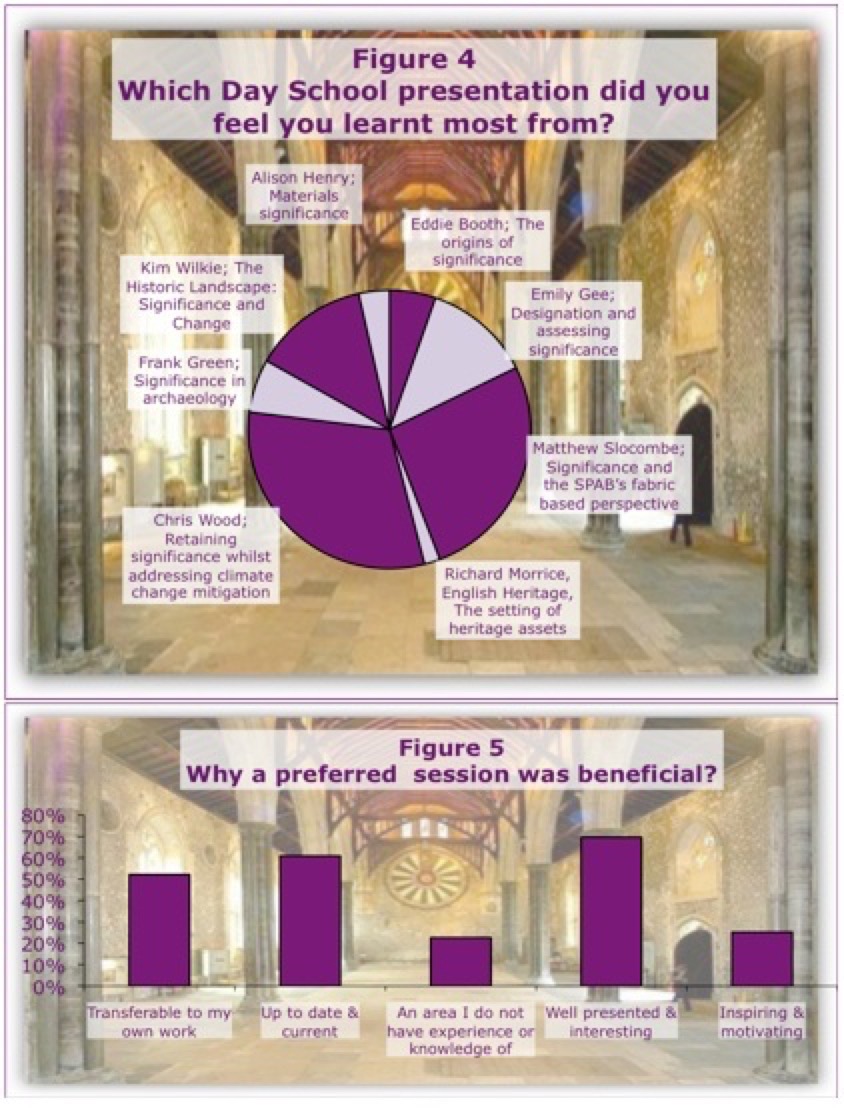
In the main delegates found the talks useful and relevant and comments included:
- Good variety and quality of speakers, which made for interesting discussions alongside the talks.
- A great Day School with very interesting and thought-provoking speakers.
- I enjoyed the presentations and was very pleased there was time to discuss matters through question and answer sessions throughout the day.
- Really interesting speakers and thought provoking discussion
- The topic generated some lively discussion, which is always a good indicator that the audience has engaged.
- The speakers were all very good, informative and interesting
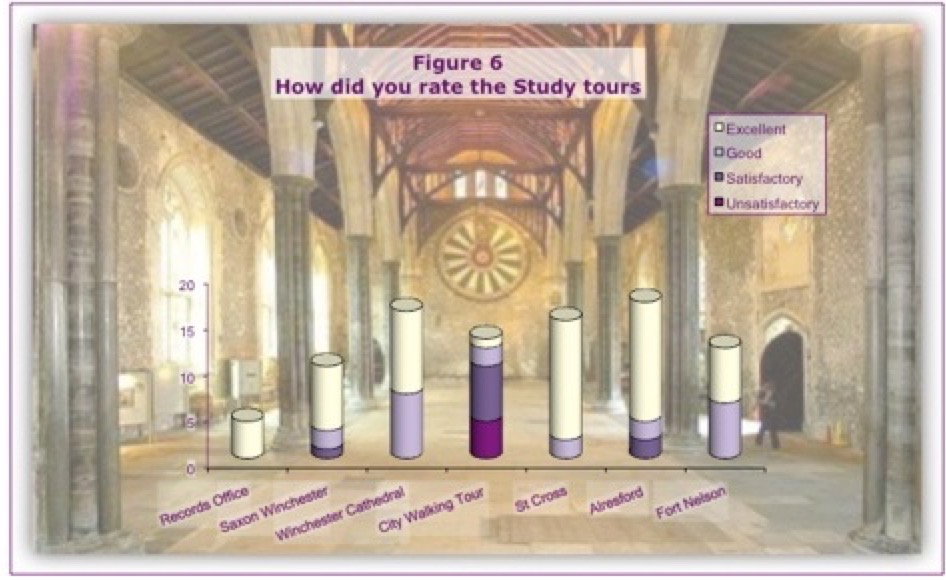
(ii) Conference organisation
Delegates were asked to rate the organisation of the conference and the booking arrangements. 95% of delegates rated the organisation of the School as good or excellent (see figure 7).
Many delegates offered unprompted comments on the organisation of the event. The following are typical examples:
- Talking to some people at the School I got the impression they assumed the IHBC was a big massively staffed body. For those of us who know this is very far from the case it seems amazing that such a professional well run event can be put on and at such a low cost.
- A superb event in all ways! Informative high quality and interesting speakers, great tours and visits and brilliant social events with excellent food and drinks.
- The experience gained from successive schools is definitely paying off (well done Fiona and Lydia). The conference documentation was excellent - particularly the annotated maps and directions.
- A seamless experience.
- Ran smoothly I thought!
- Really good positive experience
- Well done to all concerned - I thought the school was fantastic.
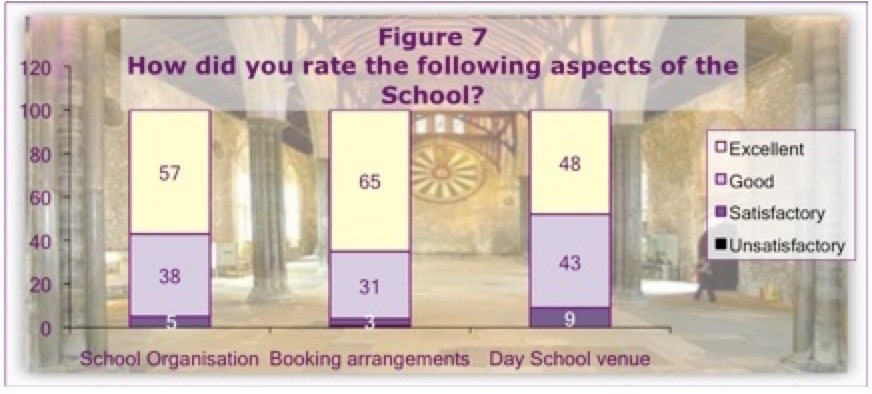
Delegates rated the school venue highly with 91% feeling it was a good or excellent venue and none feeling it to be unsatisfactory (see figure 7). The booking arrangements were likewise rated as good or excellent by 96% of delegates.
(iii) Overall conference experience
Delegates rated the overall experience they had at the conference and its usefulness very highly with 94% rating it as good or excellent. (See figure 8).
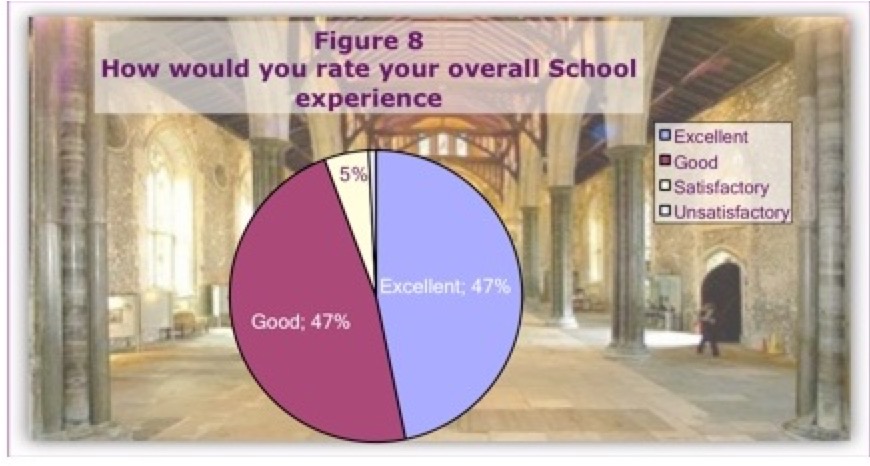
As well as the formal educational and informative aspects of the Annual School many delegates value the networking opportunities it offers by being able to get together with like-minded professionals. The social and networking aspects of the Annual School were very well received and 91% of delegates rated them as excellent or good.
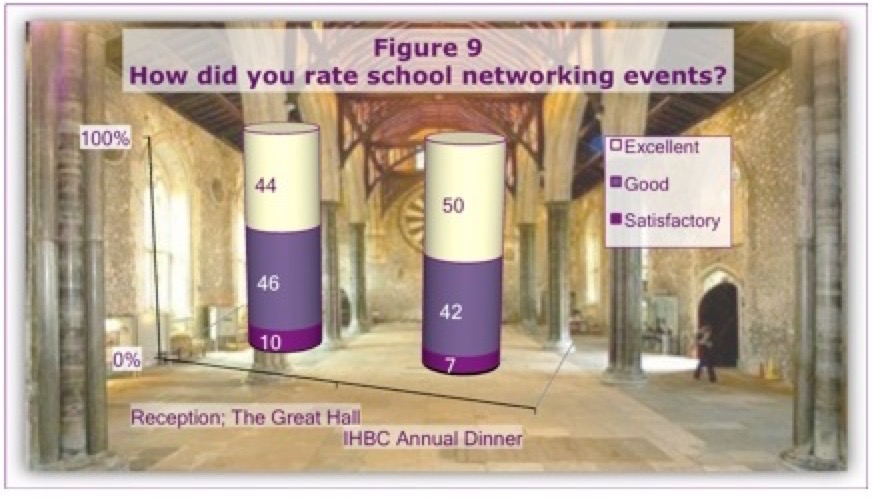
The generally high level of satisfaction is backed up further by the very encouraging data in figures 10 and 11 which reveals that 91% of delegates felt the School met their training requirements completely or sufficiently and that 99% felt the School was invaluable, very useful or useful.
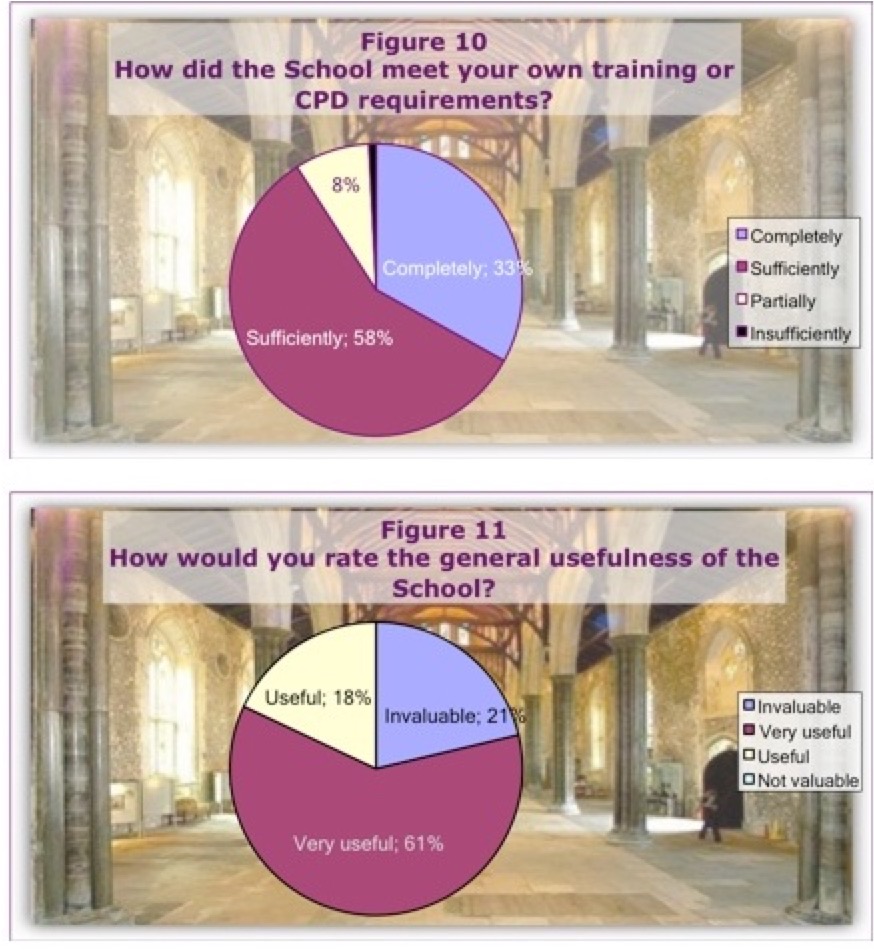
Lessons for the future from feedback
The more extensive free text options on the feedback form allowed delegates to express any concerns about areas of the Annual School which did not live up to their expectations or which they felt could be improved. This is important information as it allows the IHBC to consider how improvements can be made on the basic product of the Annual School. In general the critical comments were very limited and the key points raised were.
Negative comments from one person are balanced out equally by positive comments by another person. Of those where a substantial number of delegates felt the same way the following points were identified;
(i) Day School catering
A number of delegates were concerned, not about the standard of the catering, but about the time taken for food and drinks to be served and the long queues to serving point. The speed of catering at such events is always an issue and in knowledge of this the venue had been briefed about the number of serving points, capacity and speed of service specifically. Delegates views of the success of an event can be based on how long they have to queue and can be outside the control of organisers once they have briefed the venue. The queues for the 2012 Day School were unusually long and the staff at the venue did not act upon advice given. As the Annual School moves around the country the venue in 2013 will be different but it is clear there is a need for managing of the venue to ensure that they are able to deliver what is required.
(ii) Tour guides
A number of delegates who attended the City tour on Thursday were concerned that the tour leader was not appropriate for the tour. The tour leader was knowledgeable on specific building history but focused too much on the history and did not look at the conservation issues.
One delegate suggested “it would have been much better to have a local professional - conservation officer, architect, or archaeologist to give us a more rounded view of the city, its history and its development” whilst another felt “It would perhaps have been more useful had the study tours sought to discuss or touch upon some relevant conservation issues (eg, looking at and discuss a new build example within the historic context or a challenging aspect of conservation repair etc).”
As a general rule Annual School tours are conducted by conservation specialists or practitioners with a major involvement in projects. The Winchester tour was programmed as an architectural tour and one might expect a high level of historical background rather than practical conservation. The tour guide was a respected Blue and Green Badge guide but it is clear that delegates want something more from their tours and future tours should be lead by tour leaders who can provide a conservation overview.
Conclusion
The IHBC’s Annual School has been operating successfully since before the foundation of the Institute in 1997, and is developed from the Schools pioneered by the Association of Conservation Officers and operated effectively each year since the mid 1980’s. The Annual School is the principle platform for training and professional development for historic environment conservation specialists. It is the IHBC’s flagship national annual event drawing from customer base of IHBC members, non-member conservation professionals and broad sector interests.
The proceedings of 2012 Annual School have been described in some detail in Context the journal of the IHBC (Issue 126 September 2012) and this is a main source of record which will endure beyond the event. Six months after publication the Annual school edition of Context is made available freely to the public on the IHBC web site. Alongside this material the web site also carries Annual School resources in perpetuity (http://www.ihbc.org.uk/news/schools/ index.html) including programmes, speakers presentations and feedback details ensuring that the key aspects of the School are available for open public reference and future research.
The successful delivery of the 2012 School has reinforced the importance of the IHBC Annual School in the annual training calendar of conservation professionals and provided the opportunity for delegates to obtain quality, focused Continuing Professional Development.
